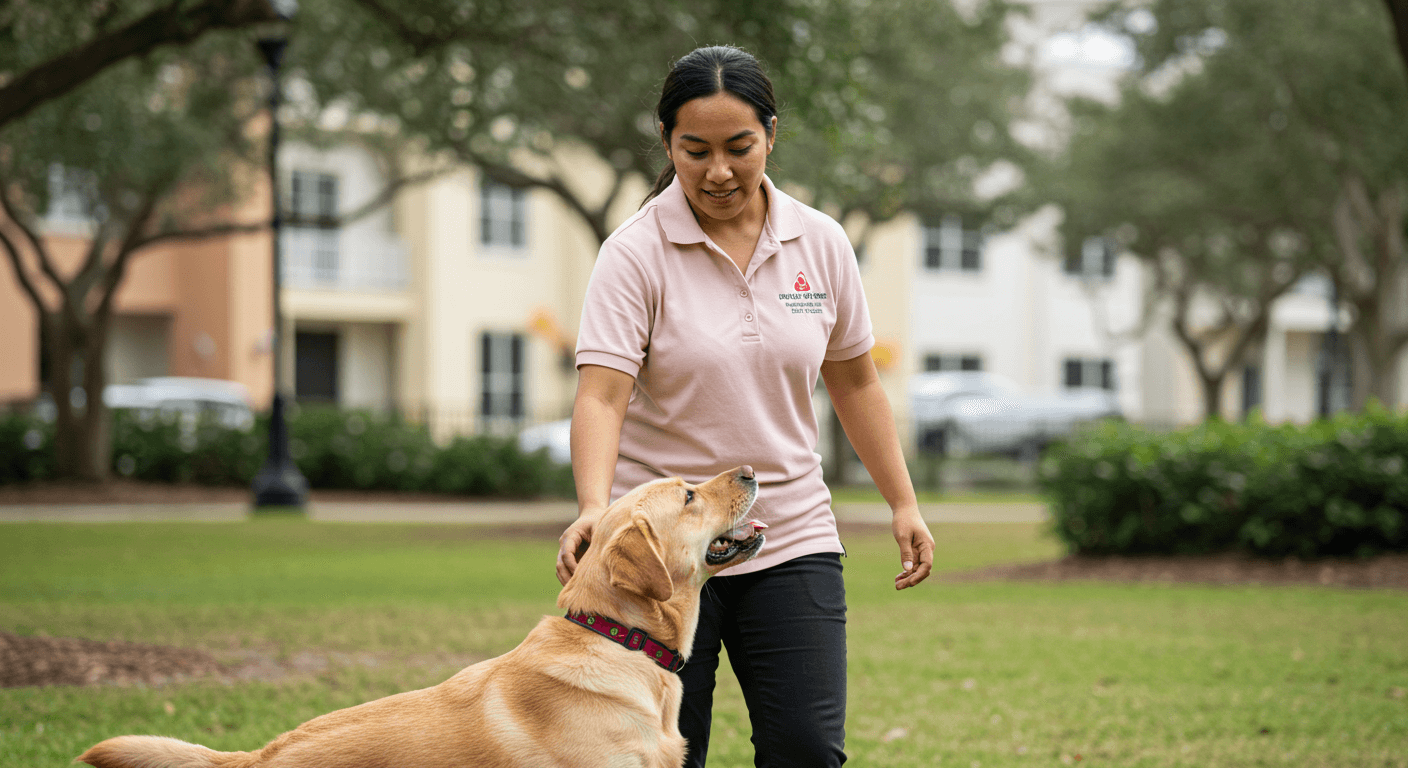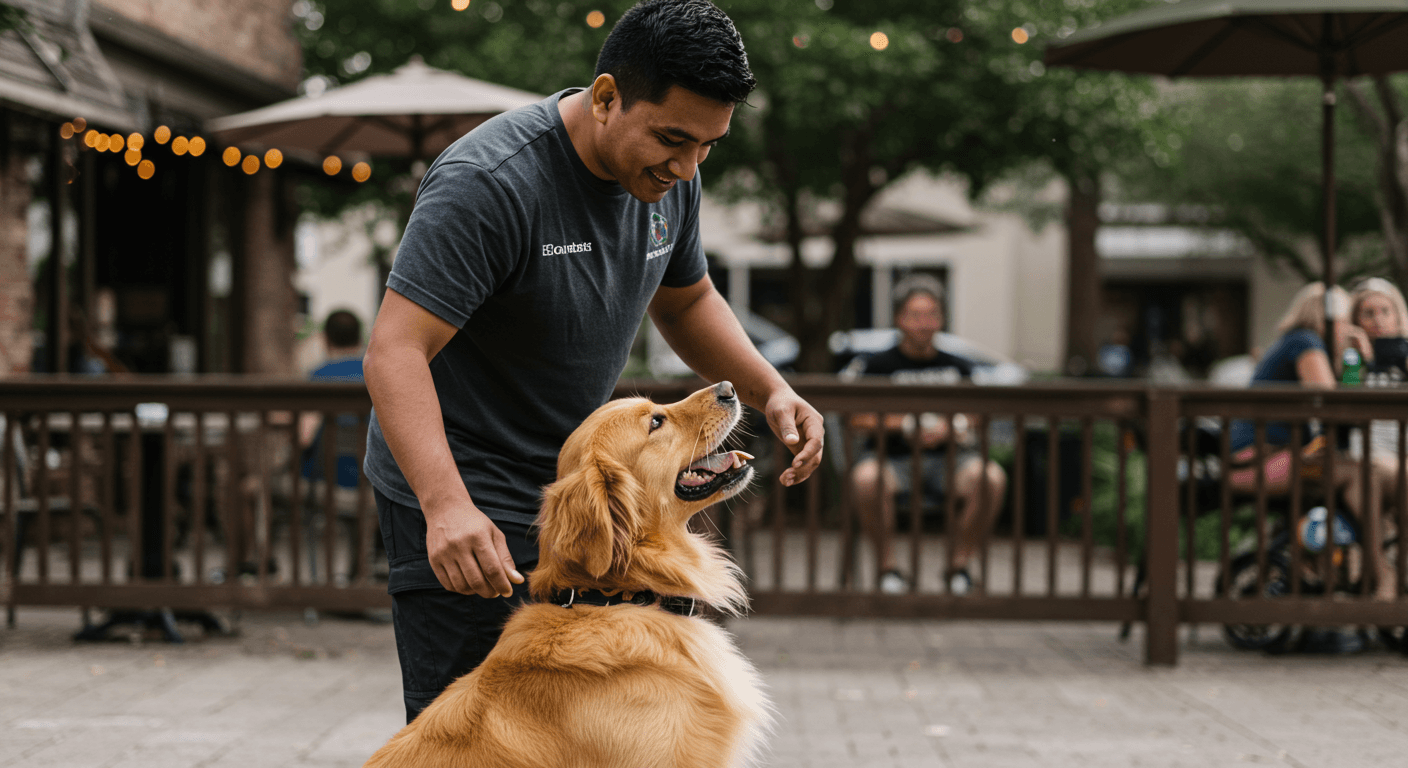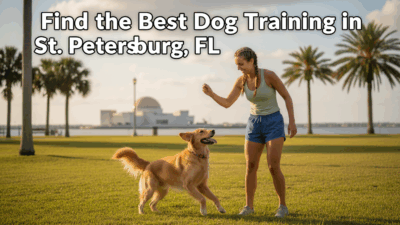Your Complete Guide to Choosing a Dog Trainer in St Petersburg FL and Surrounding Areas
Living with a dog in St Petersburg means you’ll be enjoying waterfront parks, strolling through downtown, and visiting dog-friendly patios along Central Avenue. Your dog needs to handle all of this calmly, from loose-leash walks along the Vinoy Park waterfront to staying polite when crowds gather for Saturday Morning Market.
Since St Petersburg sits in Pinellas County, most local rules follow city and county guidelines. When you find a professional dog trainer who understands these local details, you’ll get better results both at home and out in your community.
How to Choose the Right Trainer
Start by looking for someone who uses positive reinforcement training and can set realistic goals for your St Petersburg lifestyle. This means your dog should learn to walk calmly near the busy beaches, stay focused around outdoor diners, and handle vet visits without drama.
Credentials give you a quick way to compare trainers’ experience levels. Common dog trainer certifications include KPA-CTP, CPDT-KA, or IAABC-CDBC for behavior problems. If your dog has serious aggression issues, look for someone with CBCC-KA or a science-based program like CTC.
In-home dog training works great for puppy training basics, door greetings, and neighborhood leash skills. Group classes make sense once your dog can focus around other dogs, especially before you try busy spots like North Shore Park or downtown St Pete.
Common Dog Training Methods Explained

Reward-based methods build the trust you want while creating lasting behavior changes. They also help you follow St Petersburg’s rules about keeping dogs under control in public.
Basic obedience covers sit, down, stay, place, recall, and leash training so your dog can handle walks, restaurant patios, and park visits without pulling or jumping on people. These fundamentals form the foundation of a well-behaved dog.
Puppy classes focus on socialization, potty training, bite control, crate comfort, and early leash skills. Starting with short, positive training sessions prevents bad habits from forming in the first place.
Behavior modification addresses fear, reactivity, resource guarding, or separation anxiety through careful desensitization and counterconditioning. For serious cases, ask if your trainer works with local veterinarians.
Private lessons let you customize everything around your daily routines, while day training can speed up results when you’re short on time. Both approaches give your dog one-on-one attention with expert dog trainers.
Dog training classes help your dog practice good manners around other dogs and people. The best classes give dogs plenty of space, screen participants carefully, and teach calm behavior rather than just excitement.
Specialized training for dogs like therapy dog training or service dog training requires extra structure, public-access skills, and a very clear step-by-step training program. These paths demand consistent practice in real-world settings.
Stay away from trainers who use fear, intimidation, or pain to get results. Humane methods are safer for everyone, easier to maintain long-term, and much better for keeping peace with your neighbors.
Average Cost of Dog Training in St Petersburg FL (Updated for 2025)
Prices around St Petersburg and Pinellas County depend on the trainer’s experience, how long sessions last, and where the training happens. Here’s what most local pet owners are paying in 2025.
| Service Type | Average Cost (St Petersburg/Pinellas County) |
|---|---|
| Puppy classes (4-6 weeks) | $160-$290 total |
| Group obedience classes (4-6 weeks) | $170-$320 total |
| Private lessons (60-90 min) | $120-$200 per session |
| In-home coaching packages (4-6 visits) | $450-$950 total |
| Day training (trainer works your dog + handoff) | $475-$1,000 per week |
| Behavior consult for reactivity/anxiety (initial) | $160-$275 |
| Board and train (2-4 weeks) | $2,200-$4,800 total |
You’ll probably pay extra travel fees for longer distances within Pinellas County, and expect higher rates for aggressive dog training or complex behavior work. Many trainers offer a free consultation or free evaluation before you commit.
Make sure you understand what’s included, how the trainer tracks progress, and whether they offer follow-up support to help your dog maintain results.
Questions to Ask a Potential Dog Trainer
- What dog training methods do you use, and how do you keep training sessions positive and low-stress?
- What credentials do you have, like KPA-CTP or CPDT-KA? Do you keep up with continuing education such as CPDT-KSA?
- How will you customize the training plan for my dog’s specific needs and our St Petersburg lifestyle?
- Do you offer in-home visits, dog obedience training classes, or day training, and which approach fits my goals best?
- How will we measure my dog’s progress and know when to add more distractions?
- What are the total costs, including any travel fees, and what’s your cancellation policy?
- Do you carry liability insurance, and can you show me proof?
- For behavior problems, will you work with my veterinarian if needed?
- What should I practice between our sessions to help my dog keep improving?
Local St Petersburg Rules and Considerations
St Petersburg enforces leash laws and nuisance rules to keep parks and neighborhoods safe for everyone. Pinellas County follows Florida’s public health requirements too.
Leashes are required in all public spaces except inside designated dog parks. Keep a standard 6-foot leash with you for waterfront parks, beach walks, and downtown events.
Florida law requires current rabies vaccination for all dogs over four months old. You can get these through county clinics or your regular vet, and find more details through the Florida Department of Health’s rabies information page.
Excessive barking can be considered a nuisance under St Petersburg’s noise ordinance, so work with your certified dog trainer on alert barking and separation anxiety before neighbors start complaining. The city code defines excessive noise as any sound that disturbs the peace between 11 p.m. and 7 a.m., but persistent daytime barking can also be reported.
If your trainer wants to use city parks for commercial sessions, they may need permits and proof of liability insurance. Check with the St Petersburg Parks and Recreation Department for current policies.
Florida doesn’t require special licenses for dog trainers, but anyone operating a boarding facility needs to register with the Florida Department of Agriculture and Consumer Services. You can verify facility licenses through the FDACS Animal Industry page.
Pinellas County Animal Services offers resources for lost pets, low-cost vaccination clinics, and microchip programs. Their website provides updates on local regulations and available dog training services throughout the county.
St Petersburg Neighborhood Considerations
If you live in Old Northeast, your dog needs to handle narrow sidewalks, frequent pedestrian traffic, and the temptation of squirrels in every oak tree. Practice calm walking and reliable recalls in your yard before heading to busier areas.
Downtown St Pete presents different challenges with outdoor dining, crowded sidewalks along Beach Drive, and weekend festival crowds. Work on polite greetings and staying calm when strangers want to pet your top dog.
The Grand Central District offers a more relaxed training environment with local businesses that welcome dogs. Use this area to practice cafe manners and door thresholds at a slower pace.
Residents of Historic Kenwood need to prepare dogs for joggers, cyclists, and children playing in yards. Strong leash skills and a solid stay command make neighborhood life easier for everyone.
Local St Petersburg Resources for Dog Owners
These spots give you great places to practice polite manners, work on recalls, and provide safe enrichment for your dog. Always follow the posted rules and etiquette guidelines.
- North Shore Dog Park offers separate fenced areas for large and small dogs with clear rules posted. Practice recalls and calm greetings during quieter morning hours.
- Walter Fuller Park Dog Park provides another fenced option in south St Petersburg, perfect for socialization and off-leash training in a controlled environment.
- Lake Vista Park Dog Park gives residents in the northeast section of the city a convenient spot for safe off-leash practice.
- Fort De Soto Park welcomes leashed dogs on most trails and at the designated dog beach area, which gives you perfect opportunities to build focus around wildlife, families, and water distractions.
- Boyd Hill Nature Preserve allows leashed dogs on paved trails, offering a quieter setting for practicing loose-leash walking around wildlife and other hikers.

FAQs
How much does in-home dog training cost?
Most St Petersburg trainers charge $120-$200 per in-home visit, with discounts available when you buy packages. Behavior problems typically start at the higher end of that range.
Is in-home dog training worth it?
Absolutely, because you’re working on problems exactly where they happen. Your trainer can fix door manners, jumping on guests, counter-surfing, and yard reactivity right at home, then step outside to practice leash skills on your actual neighborhood sidewalks.
Can you pay someone to house train your dog?
Yes, many trainers offer puppy programs that include potty training, crate routines, and daily schedules. Day training can speed up the process while teaching you how to maintain the progress.
What is the 3-3-3 rule for dog training?
This is a helpful timeline for new or adopted dogs: expect about 3 days for your dog to decompress, 3 weeks to learn your routines, and 3 months to feel completely settled. Good training programs work with this natural adjustment period.
How long will it take to reach my training goals?
Most puppies and friendly adult dogs show solid progress within 4-8 weeks if you practice daily. Fear, reactivity, or aggression typically requires several months of careful behavior modification with gradual increases in difficulty.
What should I bring to group classes?
Pack a flat collar or harness, a 6-foot leash, high-value treats, water, and current vaccination records if your trainer requests them. Leave retractable leashes at home for safety reasons.
What’s the leash law in St Petersburg?
Dogs must be leashed and under control in all public areas, except inside designated off-leash dog parks. Keep that 6-foot leash handy for waterfront parks, downtown walks, and beach areas.
Do I need a dog license in St Petersburg or Pinellas County?
Pinellas County requires annual dog licenses for all dogs over four months old. You can register at the Pinellas County Animal Services office or online through their website, and you’ll need proof of current rabies vaccination.
What shots does my dog need in Pinellas County or Florida?
Rabies vaccination is required throughout Florida for all dogs over four months old. Your veterinarian may also recommend distemper-parvo, bordetella, and leptospirosis based on your dog’s lifestyle and exposure risks.
Are dog trainers required to be licensed in St Petersburg or Pinellas County or Florida?
No special trainer licenses exist in Florida. Trainers follow normal business regulations, but if they offer board and train services, their facility needs to be registered with the Florida Department of Agriculture and Consumer Services as a boarding kennel.
Where can I practice off-leash recall?
Use fenced dog parks in St Petersburg like North Shore Dog Park, Walter Fuller Park Dog Park, or Lake Vista Park Dog Park to keep things safe and legal. Try visiting during quieter hours when you’re starting out.
Which dog parks allow training around St Petersburg?
North Shore Dog Park, Walter Fuller Park Dog Park, and Lake Vista Park Dog Park all allow off-leash play within their fenced areas. These parks are perfect for practicing recalls, socialization, and obedience training in a safe environment.
What beaches or trails allow dogs for training?
Fort De Soto Park offers a designated dog beach area and leashed trails throughout the park, making it ideal for building focus around water, sand, and beach wildlife. Boyd Hill Nature Preserve welcomes leashed dogs on paved trails for quieter training sessions. Pass-a-Grille Beach allows leashed dogs before 9 a.m. and after 6 p.m., giving you opportunities to practice calm behavior around beach distractions during permitted hours.
How do I find a certified dog trainer in St Petersburg?
Look for trainers with recognized certifications from organizations that require continuing education and adherence to humane training standards. Ask for proof of credentials during your initial consultation, and don’t hesitate to request references from past clients.
What if my dog has separation anxiety?
Separation anxiety requires a specialized behavior modification approach that gradually teaches your dog to feel comfortable alone. Work with a trainer experienced in anxiety-related issues, and expect the process to take several months of consistent practice at home.
The right combination of thoughtful planning, humane methods, and consistent practice around St Petersburg’s parks and neighborhoods will help your dog become a confident, well-behaved companion. If credentials matter to you, don’t hesitate to ask about dog trainer certifications and how your trainer stays current with new techniques.
